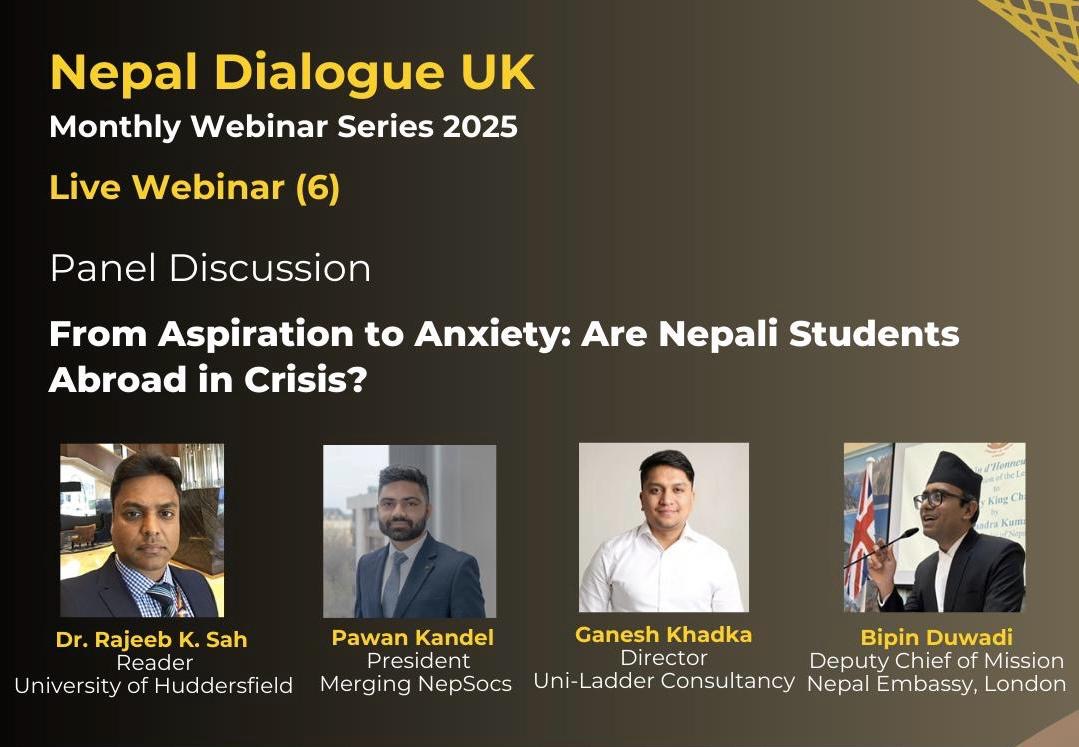Hope or Hardship? Nepali Students Abroad in Focus




The sixth episode of the Nepal Dialogue UK Monthly Webinar Series, run by the Centre for Nepal Studies UK (CNSUK) on 7th June 2025, was a panel discussion on the rising number of Nepali students pursuing higher education abroad, particularly in the United Kingdom, and the challenges they have faced. I had the opportunity to moderate this important session, where a panel of experts engaged in a detailed discussion on the challenges and solutions related to Nepali students studying in the UK.
Over the past five years, the number of Nepali students enrolled in higher education institutions in the United Kingdom has increased significantly. This trend has been driven by a combination of factors: perceived educational quality, migration opportunities, and social aspirations. However, the increasing migration also raises critical questions about student preparedness, institutional accountability, and post-study opportunities.
The webinar brought together four expert panellists to discuss the issue. The panellists—including an academic researcher, an embassy official, and education advocates—presented a critical assessment of current recruitment and support systems and proposed suggestions to ensure ethical practices and productive outcomes concerning studies in the UK. Dr. Rajeeb K. Sah, Reader at the University of Huddersfield, presented about the trend and aspirations; Bipin Duwadi, Deputy Chief of Mission, Nepal Embassy, London, spoke about cases faced and services offered by the Embassy; Pawan Kandel, the President of Merging NepSocs (a consortium of Nepali student societies located in various universities in the UK), presented trends and patterns of student recruitment and how Merging NepSocs was helping at the time of crises; and Ganesh Khadka, Director of UniLadder Consultancy, spoke about practices involving agents but also various universities targeting Nepali students in the UK.
The discussion centred on empirical trends, student experiences, and actionable strategies for reform. Data presented during the session highlighted a dramatic increase in the number of Nepali students going to the UK for higher education. For example, in 2000, there were approximately 1,000 Nepali students enrolled in UK higher education institutions, which in 2023 was over 8,000. With visa approvals for Nepali students reaching 12,655 by March 2025, Nepal now ranks among the top five countries sending students to the UK, alongside significantly larger populations such as India and China. Due to restrictive changes in recent years and months, the UK is increasingly becoming an unattractive place for international students, leading to a decline in their numbers from many different countries. Panellists predicted that despite the odds, surprisingly, the number of Nepali students in the coming year is likely to increase.
The panellists identified the following key challenges faced by the Nepali students in the UK:
Academic Transition: As the culmination of various issues alluded to below, many students have struggled with adapting to a new academic culture characterised by independent study, critical thinking, and research-based assessment. These differences often lead to underperformance, frustration, or even academic misconduct.
Financial Pressure: Rising tuition fees and living expenses in the UK place a disproportionate burden on students and their families. With limited working hours allowed during term time, challenges to find work, and lack of financial support available, students often find themselves under severe economic stress.
Mental Health and Social Isolation: Panellists emphasised the lack of awareness and access to mental health services. Cultural stigma and systemic gaps mean that students dealing with anxiety, depression, or loneliness often go unsupported. They highlighted unfortunate cases happening, including suicides.
Unethical Recruitment Practices: Presenters pointed out the growing influence of unregulated educational consultancies in Nepal. These entities often prioritise commission over student welfare, resulting in students choosing inappropriate institutions or programs. Similarly, they also highlighted the poor and unethical recruitment practices of various lower-run universities in the UK, desperate to attract more international students in order to fund their survival.
Immigration and Employment Uncertainty: With the UK frequently revising post-study work and dependent visa policies, many students face uncertainty about their long-term prospects. This influences their return-on-investment calculations and adds to psychological stress, highlighted above.

Towards Solutions and Support
Some immediate and longer-term solutions were discussed during the deliberation. The most important among them was the requirement for ethical reform in recruitment involving both the educational consultancies and universities. The webinar called for the establishment of regulatory oversight and a code of conduct for education consultancies operating in Nepal. Pre-departure orientation sessions should be mandated and standardised, covering academic expectations, financial planning, legal rights, and well-being.
The webinar also highlighted the need for strengthening diplomatic and institutional coordination, fostering better coordination among the Nepali government, British Embassy, and universities to monitor student welfare and recruitment practices. It also called to promote ethical and transparent university partnerships. The panellists emphasised the importance of promoting informed, goal-oriented decision-making among students. Diversifying university choices and considering postgraduate or niche programmes with stronger employment pathways may lead to better outcomes.
The Nepali Embassy reaffirmed its commitment to supporting students in crisis and pledged to engage with UK universities and agencies on matters of ethics and student care. In the face of rising student-related problems, there requires a clear mechanism and service provision capable of dealing with the gravity of the situation.
Conclusion: A Shared Responsibility
The Nepal Dialogue UK webinar highlighted both the opportunities and vulnerabilities faced by Nepali students in the UK. As student numbers continue to rise, the need for ethical recruitment, stronger support systems, and collaborative governance becomes increasingly urgent. The session concluded with a call to action: stakeholders—including governments, educational institutions, and the Nepali diaspora—must work together to build a transparent, student-centric, and ethically governed international education framework. Only through such coordinated efforts can the aspirations of Nepali students abroad be transformed into sustainable success.
-Dr Sushma Basnet, CNSUK
सम्बन्धित सामग्रीहरू
हाम्रो सिफारिस
- १
- २
- ३
- ४
- ५










